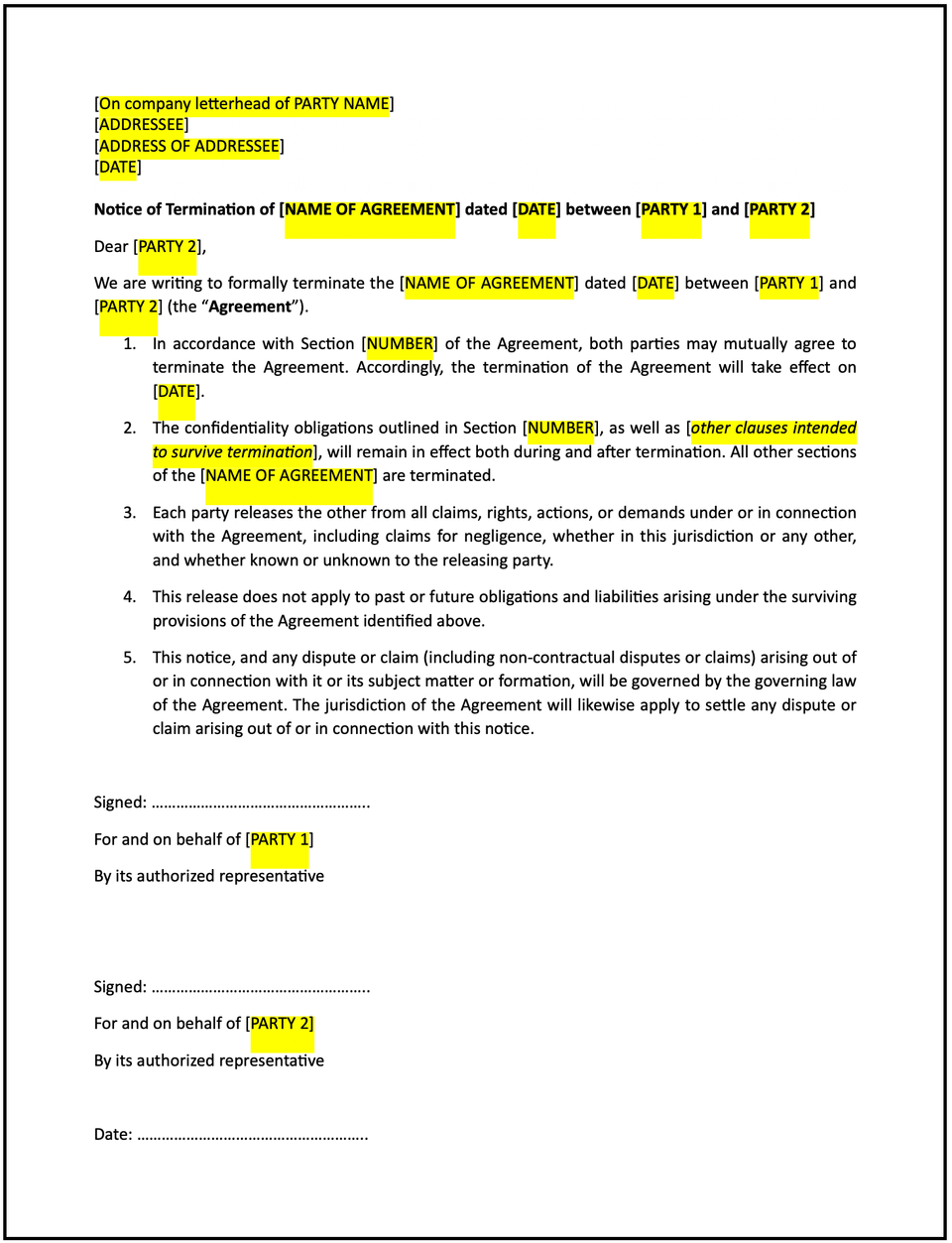Letter of termination of contract based on mutual consent: Free template

Notice of termination of contract based on mutual consent
Terminating a contract by mutual consent ensures both parties agree to conclude the agreement amicably and on clear terms. This letter provides a professional way to confirm the mutual decision, outline the termination details, and clarify any final obligations or next steps.
How to use this notice of termination of contract based on mutual consent
- Reference the contract: Clearly identify the contract, including its title, reference number, and the parties involved. Provide the execution date for context.
- Confirm mutual consent: Clearly state that both parties have agreed to terminate the contract and outline the effective termination date.
- Specify final obligations: Address any remaining responsibilities, such as final payments, the return of materials, or the resolution of ongoing issues.
- Acknowledge the relationship: Maintain a positive tone by recognizing the business relationship and any contributions or achievements under the agreement.
- Maintain a professional tone: Ensure the letter is respectful and clear, focused on concluding the agreement amicably.
- Request acknowledgment: Ask the other party to confirm receipt of the letter and agree to its terms if not already done.
Benefits of using a notice of termination of contract based on mutual consent
This letter template provides a professional and transparent way to formalize the termination of a contract by mutual agreement. Here’s how it helps:
- Ensure clarity: Clearly outlining the termination terms prevents misunderstandings and ensures alignment between the parties.
- Maintain relationships: An amicable and respectful tone preserves the business relationship, which may be valuable for future collaborations.
- Address final obligations: Confirming any remaining responsibilities ensures a clean and organized conclusion to the agreement.
- Provide documentation: The letter serves as a formal record of the mutual consent to terminate the contract, which may be important for legal or auditing purposes.
- Minimize disputes: By formalizing the mutual agreement, the letter reduces the risk of potential disputes or misunderstandings.
Tips for writing an effective notice of termination of contract based on mutual consent
- Be specific: Clearly reference the contract and the agreed termination date to avoid ambiguity.
- Address final actions: Specify any remaining responsibilities or deliverables to ensure all obligations are met.
- Use professional language: Maintain a respectful and positive tone, emphasizing the mutual agreement and collaboration.
- Acknowledge contributions: Briefly recognize the work or value derived from the agreement to maintain goodwill.
- Keep it concise: Focus on the key points and avoid unnecessary details that could detract from the main message.
Frequently asked questions (FAQs)
Q: What details should I include in this letter?
A: Include the contract reference, the effective termination date, confirmation of mutual consent, and any remaining obligations or next steps.
Q: Should both parties sign the letter?
A: If possible, both parties should sign the letter to formally acknowledge and agree to the terms of termination.
Q: Who typically receives this letter?
A: Send the letter to the other party or parties involved in the contract, typically their legal or operational representatives.
Q: How formal should this letter be?
A: The tone should be professional and respectful, reflecting the importance of concluding the contract amicably.
Q: When should this letter be sent?
A: Send the letter promptly after both parties agree to terminate the contract to formalize the agreement.
Q: Can this letter include confidentiality or non-compete terms?
A: Yes, if the original contract or mutual agreement includes these terms, they can be reiterated in the termination notice.
Q: Is this letter necessary for verbal agreements?
A: Yes, confirming termination in writing is important to formalize the mutual agreement and provide a clear record.
This article contains general legal information and does not contain legal advice. Cobrief is not a law firm or a substitute for an attorney or law firm. The law is complex and changes often. For legal advice, please ask a lawyer.


